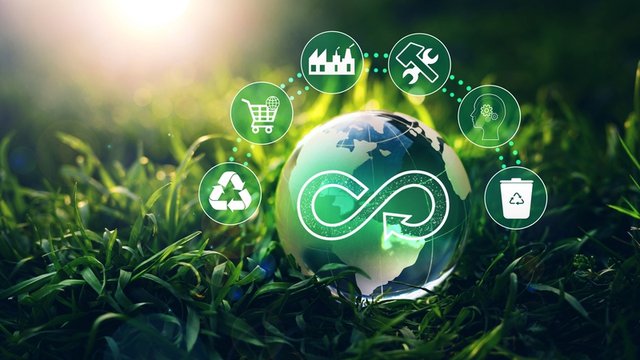
What is a circular economy?
Edited on Aug. 26, 2025

In today’s world, environmental responsibility is more important than ever — and one key concept shaping the future is the circular economy. But what is a circular economy, and how can it transform the way we live, work and consume?
The circular economy offers a sustainable alternative to the traditional take-make-dispose model by keeping resources in use for as long as possible. It aims to eliminate waste altogether by transforming it into new, valuable inputs — fundamentally reshaping how we produce and consume.
If you're interested in understanding and applying these principles in real-world contexts, the Master in Sustainability at Universidad Europea provides the advanced training needed to lead sustainability efforts in business, government, and beyond.
What does circular economy mean?
To fully grasp what circular economy means, it's helpful to compare it with the linear economy — where products are made, used, and thrown away. The circular economy, by contrast, is built around three core principles:
- Designing out waste and pollution: Products and processes are intentionally developed to minimise waste and support reuse.
- Regenerating natural systems: Sustainability is promoted by actively supporting biodiversity and restoring ecosystems.
- Keeping products and materials in use: Instead of discarding, materials are reused, repaired, or recycled to maintain their value.
Key actions of the circular economy
To understand what a circular economy is, it's important to look at the practices that bring it to life:
- Redesign products and services to minimise environmental impact.
- Reduce unnecessary consumption and waste generation.
- Reuse existing items or repurpose them for new functions.
- Repair broken goods instead of replacing them.
- Renovate and update old products to extend their lifecycle.
- Recover used materials for reintegration into manufacturing.
- Recycle waste into raw materials for future use.
Real-world examples of the circular economy
Many leading companies are already embracing the circular economy:
- Patagonia manufactures clothing from recycled materials and runs its “Worn Wear” programme to encourage product repair and resale.
- IKEA has introduced furniture recycling and buy-back schemes, promoting reuse and material recovery.
- Renault reconditions and resells used car parts with full warranties, reducing waste in the automotive industry.
- Ecoactive creates packaging made from fungi-based materials that can be composted after use.
Career opportunities in the circular economy
The rise of the circular economy is opening new career paths in various sectors:
- Education: Share knowledge of circular practices in schools, businesses, or community programmes.
- Consulting: Advise organisations on how to transition to circular systems and reduce environmental impact.
- Design: Use ecodesign to develop sustainable, repairable, and recyclable products.
- Waste Management: Innovate in recycling technologies and waste transformation systems.
- Innovation & R&D: Drive advancements in material science and sustainability technologies.
Benefits of embracing the circular economy
Adopting a circular approach delivers multiple benefits:
- Lower costs by reducing material waste and maximising resource use.
- Increased innovation, enabling the creation of new sustainable products and business models.
- Job creation across green industries and sustainability roles.
- Environmental protection, reducing pollution and conserving natural resources.
Study sustainability at Universidad Europea
If you're ready to become part of the solution, the Master in Sustainability at Universidad Europea offers a practical, future-focused education that prepares you for impactful roles in sustainability and circular economy systems.
With a strong emphasis on real-world application and interdisciplinary science, Universidad Europea’s business and technology masters programmes equip graduates to thrive in today’s evolving environmental landscape. Learn more about how our programmes can help you build a career that makes a difference.
Article published on April 8, 2022